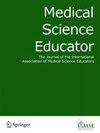Medical Students’ Self-Perceptions of Harassment During Clinical Placement
IF 1.9
Q2 EDUCATION, SCIENTIFIC DISCIPLINES
引用次数: 0
Abstract
Abstract Objectives Exploring workplace dynamics during clinical placement is crucial to determine whether medical students are encountering safe and meaningful learning experiences. The aim of this original article is to describe medical students’ reported harassment experiences whilst on clinical placement. Design Medical students in years 4 to 6 were invited to participate in the survey. In this mixed-methods study, data collection included demographic information, responses to the Generalized Workplace Harassment Questionnaire, and qualitative commentaries. Results Two hundred and five students completed the questionnaire. Medical students experienced harassment in areas of verbal aggression, disrespect, isolation/exclusion, threats/bribes, and physical aggression. Concerning levels of occurrence were noted for disrespect, isolation/exclusion, and verbal aggression. Conclusions Many medical students in this study reported experiencing harassment during their clinical placements indicating that harassment during clinical placement continues to be of concern in medical education. The findings indicate that further initiatives need to be designed to identify and respond to these cases of workplace harassment and that power imbalance and safe reporting appear to be further issues of concern. It was evident that students need to feel safe enough to be able to report harassment experiences to allow managers and educators to address the full extent of the problem.医学生对临床实习中骚扰的自我认知
摘要目的探索临床实习期间的工作场所动态对于确定医学生是否遇到安全和有意义的学习经历至关重要。这篇原创文章的目的是描述医学生在临床实习期间报告的骚扰经历。设计邀请4 ~ 6年级医学生参与调查。在这项混合方法的研究中,数据收集包括人口统计信息,对广义工作场所骚扰问卷的回应,以及定性评论。结果共225名学生完成问卷调查。医学生在言语攻击、不尊重、孤立/排斥、威胁/贿赂和身体攻击等方面经历过骚扰。在不尊重、孤立/排斥和言语攻击方面,发生的程度令人担忧。结论:本研究中许多医学生报告在临床实习期间遭受过骚扰,表明临床实习期间的骚扰仍然是医学教育中值得关注的问题。调查结果表明,需要制定进一步的举措,以查明和应对这些工作场所骚扰案件,权力不平衡和安全报告似乎是进一步关注的问题。很明显,学生需要感到足够安全,能够报告骚扰经历,以便管理人员和教育工作者能够全面解决问题。
本文章由计算机程序翻译,如有差异,请以英文原文为准。
求助全文
约1分钟内获得全文
求助全文
来源期刊

Medical Science Educator
Social Sciences-Education
CiteScore
2.90
自引率
11.80%
发文量
202
期刊介绍:
Medical Science Educator is the successor of the journal JIAMSE. It is the peer-reviewed publication of the International Association of Medical Science Educators (IAMSE). The Journal offers all who teach in healthcare the most current information to succeed in their task by publishing scholarly activities, opinions, and resources in medical science education. Published articles focus on teaching the sciences fundamental to modern medicine and health, and include basic science education, clinical teaching, and the use of modern education technologies. The Journal provides the readership a better understanding of teaching and learning techniques in order to advance medical science education.
 求助内容:
求助内容: 应助结果提醒方式:
应助结果提醒方式:


